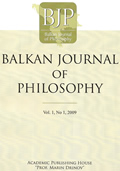Intentionalism: A Theory of Self-Deception
Intentionalism: A Theory of Self-Deception
Author(s): Ivan CerovacSubject(s): Philosophy
Published by: Институт по философия и социология при БАН
Keywords: Self-deception; Intentionalism; Anti-Intentionalism; Mind partitioning; Attentional strategy.
Summary/Abstract: is it an intentional action of an agent? This paper discusses intentionalism, a theory claiming that self-deception is intentional behavior that aims to produce a belief that the agent does not share. The agent is motivated by his belief that p (e.g. he is bald) and his desire that not-p (e.g. not to be bald), and if self-deceiving is successful, the agent will end up believing not-p. Opponents of intentionalism raise two different objections: it seems that self-deceiver should then simultaneously hold two incompatible beliefs (namely, that p and not-p), as well as simultaneously intend the deception and be unaware of it. This paper reviews possible answers to anti-intentionalist objections (temporal partitioning, psychological partitioning, and the attentional strategy account) and offers guidelines to strengthen intentionalist claims.
Journal: Balkan Journal of Philosophy
- Issue Year: VII/2015
- Issue No: 2
- Page Range: 145-150
- Page Count: 6

